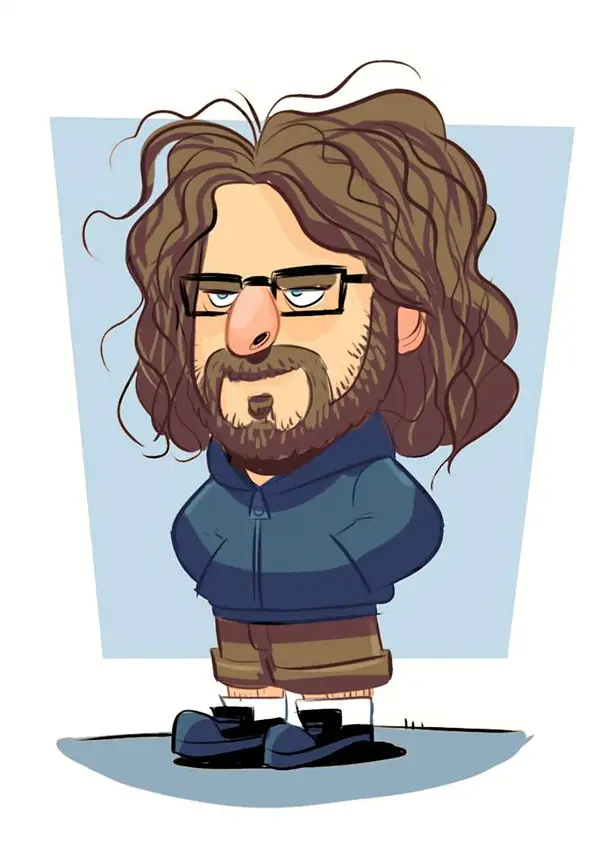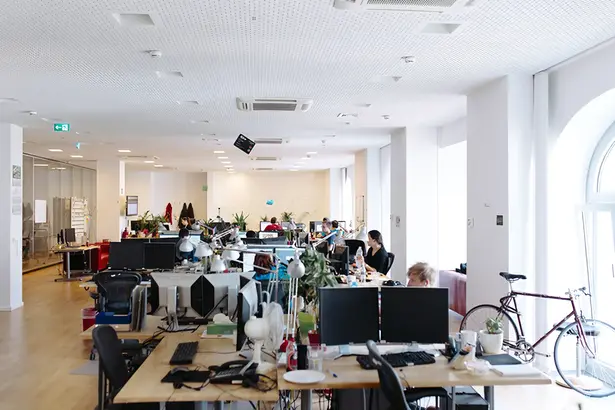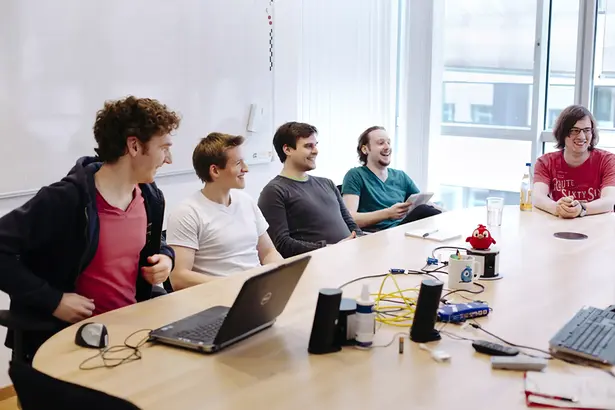GameDuell in the news
- Ranking of the 35 biggest German game developers published by Gameswirtschaft.de
11.01.2017
- Our tool tip in Making Games Magazine December 2016
20.12.2016
- Gamasutra: First Grand Gin Rummy Tournament has started
16.11.2016
- Office Drop In - A tour of GameDuell's Office
29.08.2016
- GameDuell Studio Portrait on Gamesauce.biz
27.06.2016
- Our tool tip HAXE at Making Games Magazine 04/16
22.04.2016
- Guest article at Heise Developer about glassfish / JEE7 migration
23.03.2016
- GameDuell joins the federal games association GAME (German)
01.12.2015
- Belote.com organizes World Championship (French)
17.11.2015
- The Importance of High-Quality Artwork in Mobile Games
06.11.2015
- JAXenter Java Magazin: JEE-7-Migration im laufenden Betrieb (German)
12.08.2015
- Q & A with our lead developer at Freie Universität Berlin (German)
31.07.2015
- Cross-Platform Game Development with the GameDuell DuellTool
24.07.2015
- How to get a job at Berlin casual developer GameDuell
24.07.2015
- GameDuell hires Nintendo
03.07.2015
- The Duell Tool is finally out there
02.06.2015
- Under the blue sky (German only)
26.05.2015
- Deutschlandradio Kultur on GameDuell's healthy lifestyle (German only)
19.05.2015
- El Passion features GameDuell as one of the 10 most promising Berlin startups
13.05.2015
- Making Games Magazine: From Core to Casual
05.05.2015
- Berliner Morgenpost lists the most popular apps from Berlin
14.01.2015
- Tagesspiegel about meeting of games industry with Berlin Senator of Economic Affairs (German)
17.10.2014
- Gründerszene publishes virtual GameDuell office tour (German)
30.09.2014
- Berliner Zeitung about the boom of creative industries (German)
30.09.2014
- Interview Feature with our new art director on Gamasutra
19.09.2014
- Deutsche Startups: “Als Gründer sollte man nicht an den Exit denken” (German)
25.06.2014
- Making Games Magazine 3/2014 (German)
04.06.2014
- Skillgaming.de Review Balloon Blast (German)
19.05.2014
- Gamesindustry.biz about GameDuell's Casual Connect Presence
20.02.2014
- Bloomberg TV: What Merkel's Re-Election Means to German Startups
23.09.2013
- Die Welt: Weniger Bauchgefühl, mehr Analyse (German)
18.09.2013
- Muensterlandzeitung.de: 18, 20, weg - Skatspiel wird 200 Jahre alt (German)
04.09.2013
- Tagesspiegel: Das liebste Spiel der Deutschen (German)
04.09.2013
- Pocketgamer: Don't count on chat apps being the next big gaming platform, warns GameDuell
10.08.2013
- GDC Europe: Michael Kalkowski talks about 120 new game positions GameDuell intends to fill this year
08.08.2013
- GamesMarkt: GameDuell investiert in Wachstumsmärkte (German)
30.07.2013
- Westfalenpost: Entwickler-Branche boomt - Smartphone-Spiele immer beliebter (German)
24.06.2013
- Morgenweb: Trend zu einfachen Spielen (German)
14.06.2013
- Gamesauce: Casual Connect Asia - GameDuell founder Michael Kalkowski talks about "What Brings Out the Best in People"
21.05.2013
- Deutsche-Startups: "Und herzlich winkt die Queen – Hausbesuch bei GameDuell" (German)
17.05.2013
- RBB Inforadio: "Berliner IT-Branche im Aufwind" (German)
26.04.2013
- TV Berlin: "Politik trifft auf Online-Spiele" (German)
25.04.2013
- Tagesspiegel: "Spielend informiert" (German)
25.04.2013
- IHK Berlin: "Angekommen im Mittelstand? Wirtschaft und Politik zu Besuch bei erfolgreichen Berliner Start-Up Unternehmen" (German)
25.04.2013
- Berliner Zeitung: "Außer Berlin nur noch das Ausland" (German)
12.04.2013
- Gamesindustry.biz: "GameDuell: Langfristig komplexere Spiele schaffen" (German)
27.03.2013
- Telecomsemea.net: "tyntec verifies GameDuell's 80m users"
22.03.2013
- IT-Director.com: "Leading Casual Games Provider Selects tyntec For SMS Verification"
21.03.2013
- Pocketgamer.biz: "GameDuell CEO Bolik on how mobile fits into the social publisher's aggressive cross-platform plans"
21.03.2013
- Pandodaily.com: "GameDuell turns to tyntec for SMS-based verification of gamer identities"
21.03.2013
- Pocketgamer.biz: "Berlin special: A snapshot of how German online game companies are successfully going mobile"
21.03.2013
- Pockergamer.biz: "Gis a job: GameDuell kicks off mobile push with 130 new jobs"
28.02.2013
- Siliconallee.com: "GameDuell Eyes Up Casual Gaming; Recruiting 120 New Staff"
27.02.2013
- Gamasutra.com: "Developing Windows Store Apps with HTML5 - A Showcase"
12.02.2013
- Gruenderszene.de: "Berlin 2.0: Eine Gründung ist kein Sprint, sondern ein echter Marathon" (German)
22.08.2012
- Insidesocialgames.com: "GameDuell: Cross-platform players monetize 25% more than those on a single platform"
20.07.2012
- Gamesindustry.biz: "HTML5: Too Good To Be True?"
11.05.2012
Head of Studio at GameDuell, Todd English, talks about game development, motivation, and the need of taking creative risks.

Olga: Todd, you’re the Head of the Game Production Studio here at GameDuell. What does that mean?
Todd: The production studio is the heart of any gaming company – that’s where the games are made. Ultimately, I’m the one responsible for the entire development process: I try to get the best talent in the house, try to empower people to go and make fun, creative things, and then I try to get out of their way. And in the meantime, I also report to the founders and the investors about every dollar we spend and every dollar we make.
Olga: You’ve worked for super big companies before, such as PopCap and Microsoft… How come you changed to GameDuell?
Todd: There's no doubt that big companies, like Electronic Arts, Zynga, King and so on, have a lot of really good things going on. But at the same time, they are also too big to fail and, for this reason, aren't willing to take much creative risk. Being so very conscious about their profit, they tend to only take those projects that they’re sure will be a success. That’s absolutely fine but there isn’t a lot of freedom in the projects you do and it is not what I wanted to focus on – at least not at that time... Also, I often feel that big companies have a hard time enjoying the road to success. And it makes sense – if you’re a public company and you’re constantly looking at the finances and earnings’ reports, your freedom of choice becomes quite limited. GameDuell is very fortunate that it’s privately held and still run by the owners, who can choose to invest in the future instead of making it their priority to satisfy the changing demands of the public. Here, we actually have a chance of trying out things that may be controversial today but in three years that’s probably where the market is going to be.
 Olga: How long does it usually take to develop a game?
Olga: How long does it usually take to develop a game?
Todd: It depends. For a good social and mobile game you would probably need about 1.5 years, plus or minus, starting from knowing what you want to make. But truth be told, finding the “what you want to make” can take you a long, long time.
Olga: And how does a development process look like in more detail?
Todd: Well, we break it into stages. First comes the prototype stage, then you have a production plan, after usually the team develops a vertical slice of the game, when you show that you’re actually able to make what you originally planned. Then follows the creation of an alpha version, which is when the game is ‘roughly there’. After that come beta, soft launch, worldwide launch, and then finally, the game goes into social and mobile operations.
Olga: Which stage is the most exciting for you?
Todd: Operations, for sure. I can explain why. Around 2008 there was this huge transition in the gaming industry. Before, everything that you did was put on a CD, DVD or a cartridge, which you’d ship to the manufacturer and that would be it. You would spend all your time creating something very special, just to put it on somebody else’s desk and successfully forget about it. As soon as the game went to print, everyone literally went home to sleep and started rolling back into the office only about a month and a half later. But when social games started to be relevant, we could finally receive immediate, 24/7 feedback. That helped us understand that every game is more than just a product – it’s a service. And we need to deliver that service constantly over time.
Nowadays it’s possible to get feedback on every single game feature. I can look at the data and actually talk to people, see what they’re doing, question why… I can see what we’ve done well, what we’ve done wrong, and if we’re actually having an effect on people. It’s a great way to learn, actually.
 Olga: You built your career in North America, worked in Asia for quite some time, and now you’re building something in Europe. Do gaming companies all over the world have a different working philosophy?
Olga: You built your career in North America, worked in Asia for quite some time, and now you’re building something in Europe. Do gaming companies all over the world have a different working philosophy?
Todd: Yes, but not as much as you might think. Because of globalization and because of how small the world is nowadays, there’s no big difference, to be honest. I ran studios in China, Japan, Korea, Seattle, San Francisco, now in Berlin... And the way you get your job done is the same everywhere you go. Source control, continuous integration, daily standup, the role of designer, producer, artist, etc – those things never change. What is different, however, is the motivation standing behind them. Culturally and historically, the vast majority of people in China, for example, are pretty low on Maslow’s hierarchy of needs; most people in China are still motivated by physiological needs and the need to provide safety for their families. In the western world it is hard to relate to that, since most of the Americans and Europeans have no idea what that is. So in China you heavily tie everything to money. Pull off this deadline – here’s some cash. Pull off this product – here’s some cash. But there are plenty of studies that show that cash is not the best way to motivate people – once you’re no longer starving, you’re not as motivated by finance anymore.
Olga: So what are the other ways to motivate?
Todd: Learning. Personal growth. And the chance to make an impact. Those are typically the three big ones. If you allow your team members to experience these three things, they can get incredibly motivated.
Olga: That’s how you motivate people at GameDuell?
Todd: Well, I hope I set people up to motivate themselves, so I really try to do as little as possible, to be honest. I’m just trying to create an environment where people feel that they can make an impact and where they feel that they have a direct influence on things. An environment where everybody genuinely wants to be – that’s what I see as a secret to success.
PS. You might also like:Ian Bowden about his favourite graffiti in Berlin and how a degree in English can help become a successful game maker